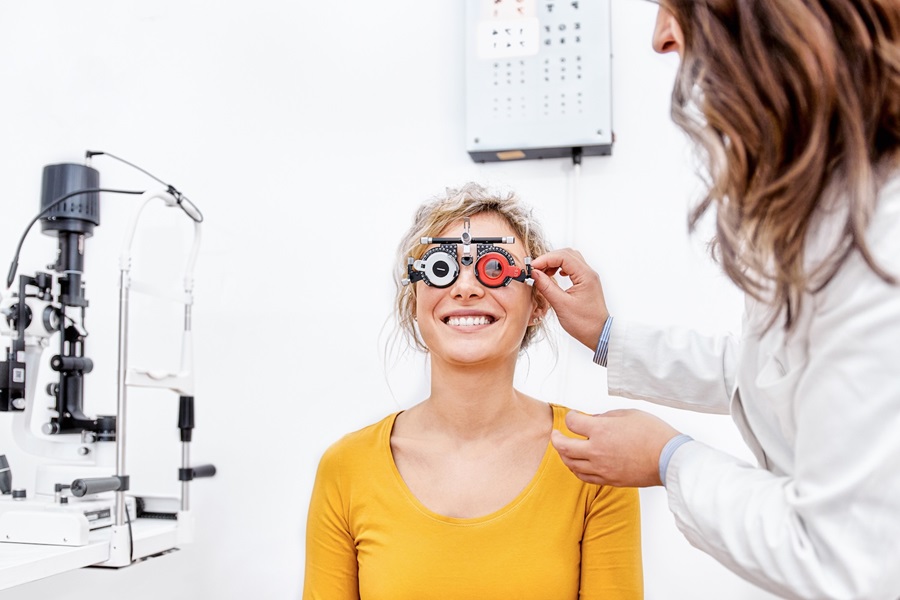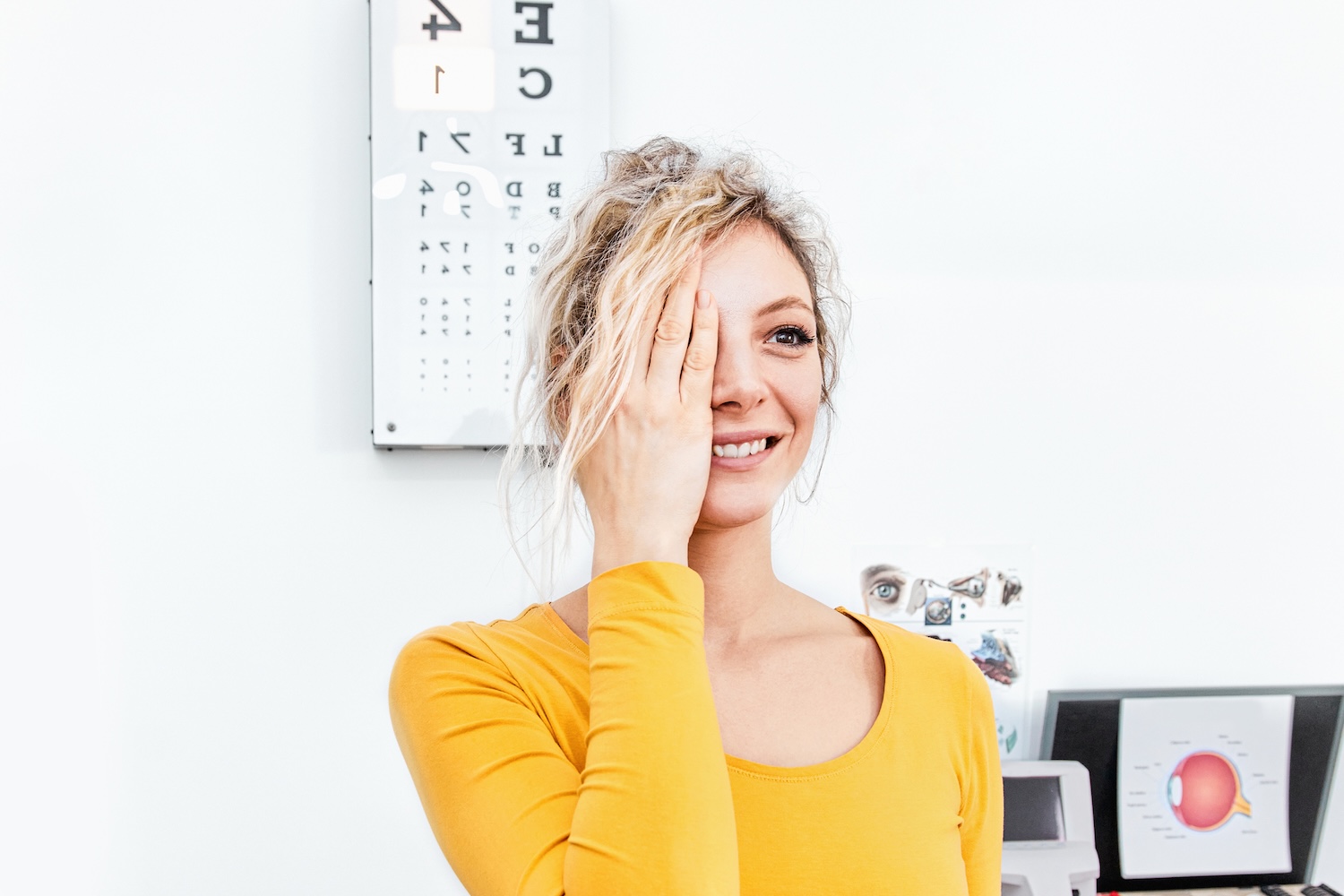- Home
- Mind & body
- About eye health
At CBHS we help you manage your health challenges. We believe in offering you the services, support and tools you need to live your best life.
Health and Wellness Programs are available to support eligible members towards a healthier lifestyle. Each Health and Wellness Program is subject to its own eligibility criteria.
Contact us for more information and to confirm your eligibility for a program.
About eye health

Seeing clearly matters – and for more than half of Australians, that’s easier said than done.
In fact, an estimated 14.4 million people (56.7% of the population) are living with at least one long-term eye condition, according to the Australian Institute of Health and Welfare. The most common issues? Long-sightedness, short-sightedness and astigmatism.
While eye health challenges can affect anyone, they’re especially common as we age – with more than 90% of Australians aged 75 and over affected by a chronic eye condition.
A significant number of people suffer from more serious age-related degenerative eye conditions, including cataracts, macular degeneration, diabetic retinopathy and glaucoma, which can lead to vision loss.
According to Glaucoma Australia, the best way to protect your sight from glaucoma is to have your eyes tested.
Top tips for keeping your eyes healthy
- Always wear sunglasses outdoors in sunlight to protect your eyes from UV light. You may not realise it, but your eyes can get sunburnt and suffer UV damage.
- Wash your hands thoroughly before handling contact lenses.
- Avoid looking directly at the sun.
- Avoid rubbing or scratching your eyes.
- Eat a healthy diet full of antioxidants (such as leafy green vegetables).
- Use eye protection when doing DIY or in work environments
where there’s a risk of getting something in your eye. - Never wash contact lenses in tap water, saliva, detergent, soap or household disinfectant. Use the solution provided for your type of contact lens. Poor lens hygiene can cause eye infections.
- Don’t smoke. Smoking has been linked to macular degeneration and can also cause cardiovascular disease, which may affect the health of your eyes.
- Get an advanced 3D OCT scan to detect potential eye health issues. Our Choice Network partner Specsavers includes a free advanced 3D OCT scan with all comprehensive eye tests.
- Have regular eye check-ups, at least every two years, with an optometrist.
Where can I find an optometrist?

When choosing an optometrist, it’s important you find a reputable provider licenced to practise and registered with the Optometry Board Australia.
While eye tests are usually covered by Medicare, if you need glasses, you may be able to claim 100% back on your CBHS Extras by choosing a provider in our Choice Network (depending on your level of cover and available limits). Our Choice Network partners are committed to providing exceptional value to all our members.
With over 9,000 dental and optical providers, including popular retailers like Specsavers, the CBHS Choice Network means even better value and more choice for members. Read our article for more information on accessing savings with the Choice Network.
Common eye conditions
Eye floaters
These are usually harmless specks or squiggly-like strands, that float across your vision, caused by changes to the vitreous (jelly-like substance) inside your eye. They sometimes move rapidly if you try to focus on them. Surgery or laser treatment is possible if floaters are bothering you.
Seek help if floaters suddenly appear, become more numerous, or if they’re accompanied by flashing light or patches of darkness in your vision. Read more about eye floaters.
Dry eye syndrome
This is a common condition – often age-related – that can make your eyes sore and your vision blurred. It happens when your eyes don’t produce enough tears, or enough of the oily substance that stops tears evaporating. Ironically, dry eye syndrome can make your vision look watery. You might also notice your eyes feel gritty or scratchy.
Women are more likely to suffer from dry eye syndrome than men, and it’s more common the older you get. It’s also increasingly common in people who spend a lot of time looking at screens.
Your optometrist can diagnose dry eye syndrome and suggest a range of drops, ointments or sprays for treatment.
Eye strain
Many activities can cause eye strain, which usually goes away when you give your eyes a chance to rest. Too long spent reading, driving, watching computer screens, straining to see in poor light or bright light, or not wearing glasses when you should, can all cause eye strain.
Symptoms can include blurred vision, soreness, headaches and tired itchy eyes.
Take regular breaks from any prolonged activity that might strain your eyes. Try adjusting the lighting, turn down air conditioning and use a humidifier to increase moisture in the air. Rest is the best treatment, especially if you can link the strain to a particular activity.
If you experience any of those symptoms without an obvious cause, see your optometrist or your GP.
Computer vision syndrome (CVS) is a common type of eye strain, whether you’re working, studying, or scrolling, prolonged screen use (two or more hours at a time) can place extra stress on your eyes. Compared to printed pages, screens often have lower contrast, more glare, and constantly shifting distances — which can all contribute to CVS.
Symptoms are the same as eye strain, including dry, itchy or watery eyes, blurred vision, headaches or neck pain, and eye fatigue and trouble focusing.
The best ways to protect your vision are:
- Try the 20-20-20 rule – every 20 minutes, look at something 20 feet away (about 6 metres) for 20 seconds
- Adjust screen brightness and reduce glare
- Sit at the right distance and adopt good posture when working
- Stay hydrated and blink often to avoid dry eyes
In some cases, an optometrist may recommend prescription computer glasses or vision therapy tailored to your needs. These are different from general blue light glasses and are designed to reduce digital eye strain.
Cataracts
Cataracts are the leading cause of blindness in adults throughout the world. They’re generally (but not always) age-related and caused by hardening of the lens inside your eye, which makes your vision cloudy or blurred. Cataracts can also make you more sensitive to light and may make you see double.
Cataracts can occur in one or both eyes.
You’re more at risk of developing cataracts if you:
- smoke
- have a family history of cataracts
- have diabetes
- spend a lot of time in the sun without adequate eye protection
- have a history of eye injury.
Most people have some degree of cataracts by the time they are 70-80.
In most cases, cataracts can be treated successfully with a simple surgical procedure, done under local anaesthetic.
Glaucoma
Glaucoma is a progressive eye condition that damages the optic nerve and can lead to tunnel vision or even blindness if not treated. It often develops without noticeable symptoms, meaning many people may not realise they have it until their vision is already affected.
According to Glaucoma Australia, around 300,000 Australians live with glaucoma—and half of them don’t know it. While it’s more common in older adults, glaucoma can occur at any age. There’s currently no cure, but early diagnosis and proper management can help slow or stop the condition’s progression.
There are two main types of glaucoma:
- Open-angle glaucoma – where fluid builds up in the eye despite the drainage pathways being open.
- Closed-angle glaucoma – where the drainage pathways become blocked or narrowed, causing a sudden spike in eye pressure. Acute angle-closure glaucoma is a medical emergency—seek immediate care if you experience symptoms like eye pain, headaches, nausea or sudden vision changes.
Treatment for glaucoma may include:
- Prescription eye drops or tablets
- Laser therapy
- Surgery to improve fluid drainage
Glaucoma surgery is often a same-day procedure and is tailored to the individual. Regular eye checks with an optometrist are essential for early detection, especially if you’re at higher risk.
Age-related macular degeneration
As the name suggests, age-related macular degeneration (AMD) is a disease associated with ageing. AMD affects central vision, creating blind spots or distorting or darkening certain patches of vision. AMD doesn’t improve with prescription glasses and it makes driving, reading or seeing faces more difficult.
According to the Macular Disease Foundation, one in seven Australians over the age of 50 have some evidence of the disease. People with a direct family history have a 50% chance of developing AMD. People who smoke are three to four times more likely to develop the disease.
You’re more at risk if:
- you’re over 50
- you have a family history of AMD
- you smoke
- you don’t have regular eye exams
AMD can progress slowly or rapidly, with gradual or sudden loss of vision. Like glaucoma, there are often no symptoms in the early stages of the disease.
Treatment depends on the type of age-related macular degeneration.
Wet AMD can be stabilised by combining regular injections of a variety of drugs with daily self-monitoring. Laser therapy is also an option. Dry AMD currently has no medical treatment.
Stopping smoking, regular exercise and a healthy diet can all help eye health and reduce the risk of developing macular degeneration. You can read more about nutrition for eye health on the Macular Disease Foundation website.
As with so many other conditions, early detection can help limit vision loss. Have your eyes checked regularly and see your GP or eye health professional immediately if you experience any sudden loss of vision.
You can visit Specsavers – a CBHS Choice Network provider and get a free advanced 3D OCT scan with all comprehensive eye tests to help you stay up-to-date with your eye health.
Diabetic retinopathy
People with type 1 or type 2 diabetes are at risk of diabetic retinopathy, a disease caused by diabetes that damages the blood vessels in the retina at the back of the eye.
The longer you have diabetes, the more likely it is that you’ll develop diabetic retinopathy.
You’re more at risk if:
- your diabetes isn’t well controlled
- you have high blood pressure
- you have high cholesterol
- you smoke
- you have diabetic kidney disease
Diabetic retinopathy has few if any symptoms in the early stages. When symptoms do appear, they can include blurred or distorted vision, sensitivity to bright light, eye floaters, and slow or fast loss of vision.
Treatment with lasers can stop blood vessels leaking and stop abnormal blood vessels growing. Other forms of surgery may be necessary in more advanced cases.
As with so many other forms of eye disease, regular check-ups are vital to detect and manage diabetic retinopathy.
Symptom checker
Healthdirect has a handy symptom checker for eye and vision problems.
All information contained in this article is intended for general information purposes only. The information provided should not be relied upon as medical advice and does not supersede or replace a consultation with a suitably qualified healthcare professional.
Sources:
https://www.aihw.gov.au/getmedia/6b19e493-0ebe-420f-a9a3-e48b26aace9f/aihw-aus-249-ib.pdf
https://glaucoma.org.au/what-is-glaucoma
https://www.healthdirect.gov.au/eye-care
https://www.optometryboard.gov.au
https://www.cbhs.com.au/tools-and-support/find-a-provider
https://www.cbhs.com.au/mind-and-body/blog/what-are-eye-floaters
https://www.healthdirect.gov.au/dry-eye-disease
https://www.healthdirect.gov.au/eye-strain
https://guidedogs.com.au/juleye-national-eye-health-awareness-month/
https://www.healthdirect.gov.au/cataracts
https://www.healthdirect.gov.au/glaucoma
https://glaucoma.org.au/what-is-glaucoma/risk-factors-for-glaucoma
https://www.mdfoundation.com.au/about-macular-disease/age-related-macular-degeneration/amd-overview/
https://www.mdfoundation.com.au/news/nutrition-amd/
https://www.healthdirect.gov.au/symptom-checker
Health and wellbeing
programs & support
You Belong to More with CBHS Hospital cover:
- Greater choice over your health options including who treats you
- Get care at home with Hospital Substitute Treatment program
- Free health and wellbeing programs to support your health challenges
Live your healthiest, happiest life with CBHS Extras cover:
- Benefits for proactive health checks e.g. bone density tests, eye screenings
- Keep up your care with telehealth and digital options
- Save on dental and optical with CBHS Choice Network providers
